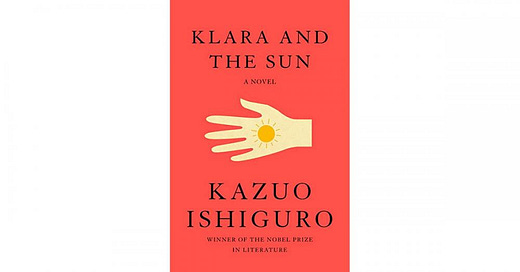Micro Review: Kazuo Ishiguro's ‘Klara and the Sun’
Debuting a new section: micro reviews by community members
Klara and the Sun, the first novel by Kazuo Ishiguro since he was awarded the Nobel Prize in Literature, tells the story of Klara, an Artificial Friend with outstanding observational qualities, who, from her place in the store, watch carefully the behavior of those who come in to browse, and of those who pass on the street outside. She remains hopeful that a customer will soon choose her.
Micro Review from Nicole Zhu
Klara is an Artificial Friend (AF) with extraordinary powers of observation and an ability to grasp complex and contradictory emotions. In a speculative near-future where children are given competitive edges by being "lifted" and AFs are among many machines that have replaced human workers, Klara becomes a companion for 14-year old Josie who suffers from an unknown terminal illness.
Written in first person, Klara and the Sun is filled with stilted machine-like language and impressions, like "giving privacy" and feeling "pain alongside my happiness," giving an uncanny and intimate filter of the world both natural and human. Through individual relationships—Josie and her childhood friend Rick, Josie and her mother, her mother and Klara, Rick and his mother—Klara gains an understanding and appreciation for the messiness of human relationships. Ishiguro provides very little exposition, relying instead on Klara’s unique point of view to build a world in which empathy, service, and sacrifice are especially intertwined.
Readers of Ishiguro’s previous books, including Never Let Me Go, will find similar explorations of loss, loneliness, and how innovation also forebodes obsolescence. As has been the case when I read his other books, the novel’s twists and turns left me feeling both quietly devastated and oddly uplifted. What do technological advancements mean for our sense of self? How do we maintain hope and compassion? What does meaningful connection look like, no matter how fleeting time may be?
"Maybe you can see things the rest of us can’t," Josie's mother tells Klara. "Maybe you’re right to be hopeful. Maybe you’re right."
Nicole Zhu is a writer and developer based in New York. Her short stories and essays have been published in Catapult, Eater, and Jellyfish Review. Subscribe to her newsletter for biweekly essays on writing and creative practices.



